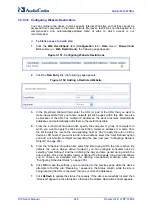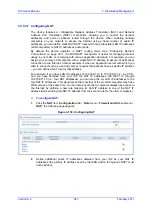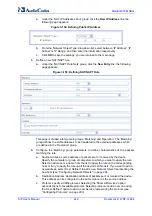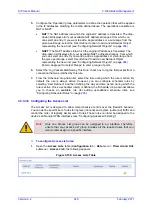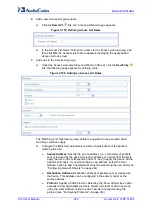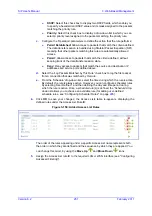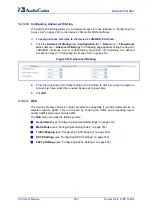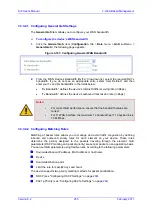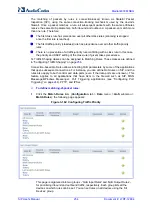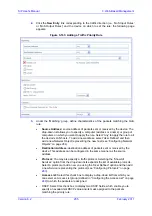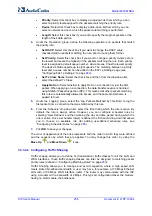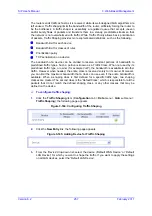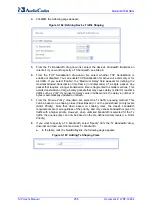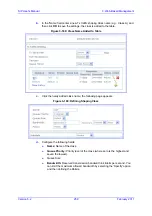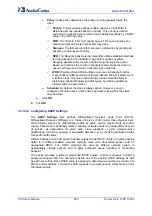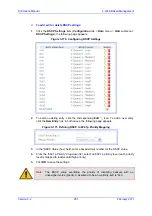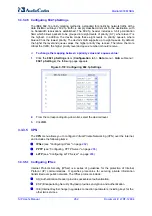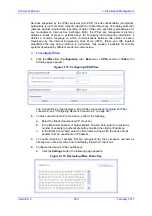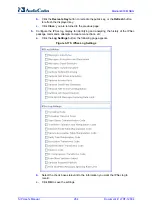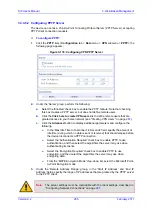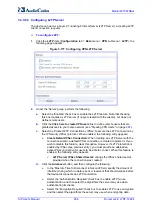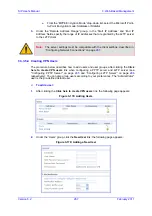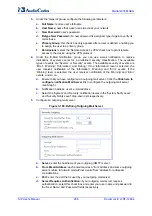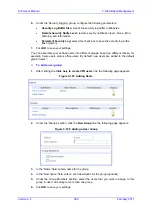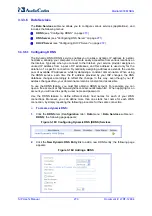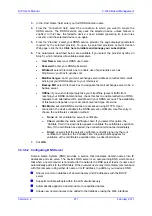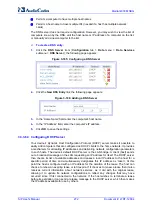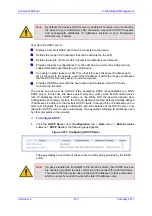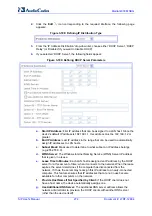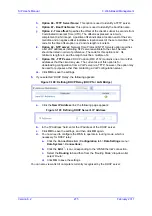
SIP User's Manual
260
Document #: LTRT-12804
Mediant 800 MSBG
♦
Policy:
Class policy determines the policy of routing packets inside the
class:
9
Priority:
Priority queuing utilizes multiple queues, so that traffic is
distributed among queues based on priority. This priority is defined
according to packet's priority, which can be defined explicitly by a DSCP
value or by a 802.1p value.
9
FIFO:
The "First In, First Out" priority queue. This queue ignores any
previously-marked priority that packets may have.
9
Fairness:
The fairness algorithm ensures no starvation by granting all
packets a certain level of priority.
9
RED:
The Random Early Detection algorithm utilizes statistical methods
to drop packets in a "probabilistic" way before queues overflow.
Dropping packets slows a source down enough to keep the queue
steady and reduces the number of packets that would be lost when a
queue overflows and a host is transmitting at a high rate.
9
WRR:
Weighted Round Robin utilizes a process scheduling function
that prioritizes traffic according to the pre-defined 'Weight' parameter of
a traffic's class. This level of prioritizing provides more flexibility in
distributing bandwidth between traffic types, by defining additional
classes within a parent class.
♦
Schedule:
By default, the class is always active. However, you can
configure schedular rules to define time segments during which the class
may be active.
e.
Click
OK
.
9.
Click
OK
.
3.3.3.4.4 Configuring DSCP Settings
The
DSCP Settings
item defines Differentiated Services Code Point (DSCP).
Differentiated Services (Diffserv) is a Class of Service (CoS) model that enhances best-
effort Internet services by differentiating traffic by users, service requirements and other
criteria. Packets are specifically marked, allowing network nodes to provide different levels
of service, as appropriate for voice calls, video playback or other delay-sensitive
applications, via priority queuing or bandwidth allocation, or by choosing dedicated routes
for specific traffic flows.
Diffserv defines a field in IP packet headers referred to as DSCP. Hosts or routers passing
traffic to a Diffserv-enabled networks typically mark each transmitted packet with an
appropriate DSCP. The DSCP markings are used by Diffserv network routers to
appropriately classify packets and to apply particular queue handling or scheduling
behavior.
The device provides a table of predefined DSCP values, which are mapped to 802.1p
priority marking method. You can edit or delete any of the existing DSCP settings, as well
as add new entries. Each DSCP value is assigned a default queue number as a part of its
802.1p priority settings. The device's QoS supports up to eight queues, where Queue 0 has
the lowest priority.
Summary of Contents for Mediant 800 MSBG
Page 2: ......
Page 366: ...SIP User s Manual 366 Document LTRT 12804 Mediant 800 MSBG Reader s Notes ...
Page 372: ...SIP User s Manual 372 Document LTRT 12804 Mediant 800 MSBG Reader s Notes ...
Page 390: ...SIP User s Manual 390 Document LTRT 12804 Mediant 800 MSBG Reader s Notes ...
Page 404: ...SIP User s Manual 404 Document LTRT 12804 Mediant 800 MSBG Reader s Notes ...
Page 616: ...SIP User s Manual 616 Document LTRT 12804 Mediant 800 MSBG Reader s Notes ...
Page 636: ...SIP User s Manual 636 Document LTRT 12804 Mediant 800 MSBG Reader s Notes ...
Page 652: ...SIP User s Manual 652 Document LTRT 12804 Mediant 800 MSBG Reader s Notes ...
Page 886: ...SIP User s Manual 886 Document LTRT 12804 Mediant 800 MSBG Reader s Notes ...

